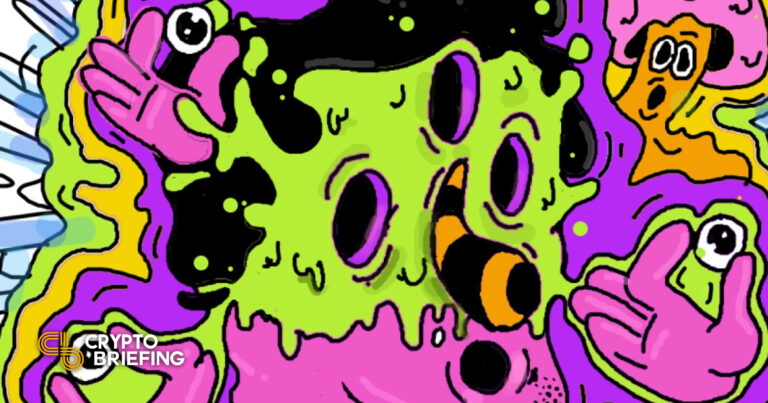Art Gobblers went live as a free mint earlier today. They’re currently trading for around $20,000 and have already amassed over $10 million in trading volume.
Art Gobblers is live and soaring on the secondary market.
The NFT collection, designed by Rick and Morty co-creator Justin Roiland and crypto investment firm Paradigm, launched today at 20:20 UTC to much hype and fanfare. While the project was launched as a free mint—meaning enthusiasts only had to pay gas fees in order to secure their NFTs—the unrevealed NFTs are already trading for tens of thousands of dollars on secondary markets.
At the time of writing, the cheapest Art Gobbler NFTs were trading for 12.5 ETH (worth about $19,575) on OpenSea, with some pieces trading closer to 15 ETH shortly after the launch. Data from recently launched NFT marketplace Blur indicates the collection has already accrued over 6,714.07 ETH ($10.4 million) in trading volume.
The 1,700 NFTs initially available for mint were accessible to whitelisted addresses via the Art Gobblers website. The NFT artwork currently displays a cartoon-style pulsating incubation chamber ahead of a reveal event on November 1. 300 Art Gobbler NFTs have been reserved for the project’s creators, and another 8,000 are scheduled for release over a period of 10 years through the project’s unique minting mechanism.
Art Gobblers is designed as a factory NFT collection, meaning that Gobbler NFTs will produce a token called GOO. The GOO token can be used to create new Gobbler NFTs, or Blank Page NFTs. The Blank Page NFTs can be used by artists as a digital canvas which can then be absorbed by Gobblers—the ownership of the art is therefore transferred to the NFT itself. Gobblers are poised to become tradeable, decentralized art galleries.
Art Gobblers’ tokenomics, however, leave much to be desired, as the project rewards early Gobbler owners at the detriment of future buyers. The more GOO a Gobbler has, the more GOO it emits, exponentially. That opens an opportunity for Art Gobbler whales to create a monopoly on the art experiment’s economy.
Disclaimer: At the time of writing, the author of this piece owned BTC, ETH, and several other cryptocurrencies.
The information on or accessed through this website is obtained from independent sources we believe to be accurate and reliable, but Decentral Media, Inc. makes no representation or warranty as to the timeliness, completeness, or accuracy of any information on or accessed through this website. Decentral Media, Inc. is not an investment advisor. We do not give personalized investment advice or other financial advice. The information on this website is subject to change without notice. Some or all of the information on this website may become outdated, or it may be or become incomplete or inaccurate. We may, but are not obligated to, update any outdated, incomplete, or inaccurate information.
You should never make an investment decision on an ICO, IEO, or other investment based on the information on this website, and you should never interpret or otherwise rely on any of the information on this website as investment advice. We strongly recommend that you consult a licensed investment advisor or other qualified financial professional if you are seeking investment advice on an ICO, IEO, or other investment. We do not accept compensation in any form for analyzing or reporting on any ICO, IEO, cryptocurrency, currency, tokenized sales, securities, or commodities.
See full terms and conditions.
Join more than 100,000 subscribers
Don’t have an account? Create one
Already have an account? Sign In
Sign In

